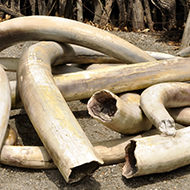UK bans elephant ivory trade

"Legal ivory markets have long provided a smokescreen for illegal trade, putting endangered elephants in further jeopardy" - James Sawyer, IFAW.
Yesterday (6 June), the UK's Ivory Act came into effect, creating a near-total ban on the sale of elephant ivory in the country.
Putting a stop to the UK trade in ivory, the ban on the import, export and dealing of items containing elephant ivory covers ivory items of all ages.
With a narrowly defined set of exemptions, it is now illegal to deal in the items unless they have an exemption certificate, or have been registered.
Lord Goldsmith, animal welfare minister, commented on the act: “The world-leading Ivory Act coming into force represents a landmark moment in securing the survival of elephants across the globe for future generations.
“Thousands of elephants are unnecessarily and cruelly targeted for their ivory every year for financial gain.
“As one of the toughest bans of its kind, we are sending a clear message the commercial trade of elephant ivory is totally unacceptable.”
The importance of the act for animal welfare cannot be overstated, with an estimated 20,000 elephants slaughtered annually for the ivory trade.
James Sawyer, director of the International Fund for Animal Welfare (IFAW) said: “Today is a good day for elephants. With as many as 20,000 elephants a year poached for ivory, this ban could not have come a moment too soon.
“IFAW believes ivory should only be valued on a live elephant and the overwhelming public support for banning the trade shows the majority of people feel the same.
“Legal ivory markets have long provided a smokescreen for illegal trade, putting endangered elephants in further jeopardy.
“Ivory trading in the UK has now rightly been consigned to the history books and everyone who has played a part in this important conservation victory should be proud.”



 The Veterinary Medicines Directorate (VMD) is inviting applications from veterinary students to attend a one-week extramural studies (EMS) placement in July 2026.
The Veterinary Medicines Directorate (VMD) is inviting applications from veterinary students to attend a one-week extramural studies (EMS) placement in July 2026.